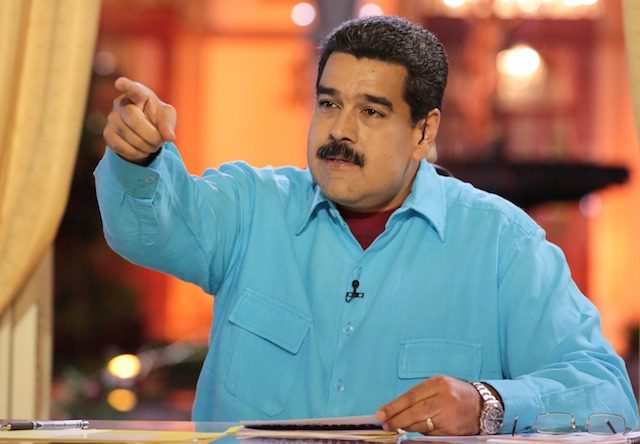SUMMARY
This is AI generated summarization, which may have errors. For context, always refer to the full article.

CARACAS, Venezuela – Venezuelan President Nicolas Maduro’s allies asked the Supreme Court on Monday, June 13, to block a bid to call a referendum on sacking him, accusing the opposition of “fraud.”
The move casts doubt on the recall vote sought by the opposition, which accuses the high court of pro-Maduro bias and has clashed with it repeatedly since winning control of congress in December.
Maduro’s opponents warn Venezuela risks exploding into unrest without a vote on sacking the leftist leader, whom they blame for an economic crisis marked by severe shortages of food, medicine and electricity.
The opposition is racing to call a referendum by the end of the year, and has submitted a petition with 1.8 million signatures to start the lengthy process.
But Jorge Rodriguez, the head of a panel appointed by Maduro to oversee the recall push, said he had filed a complaint asking the Supreme Court to “protect Venezuelans’ constitutional rights” by intervening.
Electoral authorities have accepted 1.3 million signatures submitted by the opposition as valid – well above the threshold of 200,000.
Last week, they said they would proceed to the next stage: verifying those 1.3 million signatories’ identity with fingerprint scans from June 20 to 24.
Speaking to journalists outside the Supreme Court, Rodriguez said it would be “perpetrating a brutal fraud to authorize (the opposition) to proceed to the next stage.”
He did not elaborate on the scope of the complaint or the specific action it sought.
“What we’re seeking is the defense of the constitution. This farce put on (by the opposition)… was trying to create a climate where violence would erupt,” he said.
The opposition is rushing to complete the recall process by January 10, the cutoff to trigger new elections.
After that date, a successful recall vote would simply pass power to Maduro’s hand-picked vice president.
Food protest death
Home to the world’s largest oil reserves, Venezuela has skidded into an economic catastrophe as global crude prices have collapsed over the past two years.
The country is running out of cash to import food, medicine and other basic goods, which it largely buys abroad.
The crisis is threatening Maduro and the state-led top-down economic model he inherited from his late predecessor, Hugo Chavez.
Maduro faces increasingly violent protests, whether organized by the opposition or spontaneously erupting among Venezuelans sick of standing in long lines for scarce food.
There has also been a sharp increase in looting, violent crime and vigilante justice.
A 21-year-old man was killed and 12 people wounded when a food protest turned violent Friday in the eastern town of Cariaco.
A video posted online showed police and soldiers threatening protesters when shots rang out, sowing panic among the demonstrators.
It was unclear who shot the victims. The government’s rights ombudsman, Tarek William Saab, called for “an exhaustive, objective, independent and impartial investigation.”
Bus drivers meanwhile went on strike Monday in 18 of Venezuela’s 24 states, saying the lack of spare parts was making their jobs impossible.
The move hits close to home for Maduro, a former bus driver.
International pressure
A top opposition leader, Henrique Capriles, launched a tour of Latin American countries to rally support for the bid to remove Maduro.
“The situation in Venezuela is not a matter for indifference,” he told reporters in Paraguay, the first stop on a trip that also includes Argentina and Brazil.
“It can affect what happens in Paraguay and in all the countries in the region. Do not abandon us.”
At the Organization of American States’ general assembly in the Dominican Republic, a young Venezuelan man taking part in a youth forum drew his government’s ire by urging it to accept food aid.
“We believe in humanitarian aid, but it’s different to use it in the way it’s being used in this case, to hide an unacceptable interventionist agenda,” said Bernardo Alvarez, Venezuela’s ambassador to the regional group.
Maduro accuses the United States and the Washington-based OAS of conspiring against his government.
The OAS permanent council is due to discuss the crisis in Venezuela on June 23.
Foreign Minister Delcy Rodriguez accused OAS chief Luis Almagro of being a “putschist” for calling the meeting. – Alexander Martinez, AFP / Rappler.com
Add a comment
How does this make you feel?
There are no comments yet. Add your comment to start the conversation.